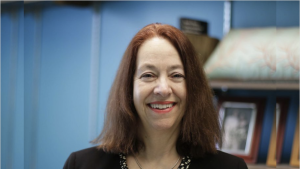Congratulations, Prof. Marsha Collins! Prof. Collins is the new chair of the Department of English and Comparative Literature.
A Professor of Comparative Literature, Marsha S. Collins specializes in the literature of Early Modern Europe, especially the Literature of Early Modern Spain in its European context. Her research focuses on romance and other idealizing fictional forms, literature and the visual arts, early modern lyric poetry, and Early Modern European court culture. She has written on romance, pastoral, ekphrasis, and early modern subjectivity, among other topics, as well as on authors such as Cervantes, Unamuno, Galdós, Góngora, Lope, and others. She is currently writing a book on “Friendship and Community in Don Quijote.”
We thank Prof. Mary Floyd-Wilson as she leaves this position after five years and welcome Prof. Collins as she succeeds Prof. Floyd-Wilson this fall.
Read below about Prof. Collins’ vision for her time as chair:
DLC: What made you interested in serving as chair of the DOECL?
Collins: “I think the pandemic had a profound impact on my thinking and gave me time for reflection on many different things. I’m sure that is in no way unique, but even during the recent, pre-pandemic years I was aware that higher education is undergoing huge changes and changing rapidly at that. I am deeply concerned about the future of the arts and humanities, which I have always believed are an integral part of what makes us human, and wanted to do what I could to help position our department and strengthen it for the future. We’ve always been leaders on this campus and I’m hoping we can continue to demonstrate that leadership in showing the importance of the arts and humanities in educating good, responsible global citizens, as well as shaping a good and just society. I have a lot of experience—and extremely varied experiences—in academic leadership, but also as a scholar, teacher, and mentor. The moment seemed right to mobilize those experiences to do what I can to help my department.”
DLC: What are the main goals you’d like to accomplish in your time as chair?
Collins: “We are an extremely diverse and busy department with such a variety of programs, as well as scholarly and pedagogical interests. We will need funding to make sure those programs remain robust and continue to grow into the future. So being proactive in fundraising and in the development of good donor relations, also the exploration of new sources of funding, are all extremely important. I’m especially concerned with funding for our graduate program and students, as well as for our departmental programs in general.
ECL is also making strides in matters of diversity, and this is another high priority for me, not just in hiring practices, but in every aspect of what we do. We need to keep pushing forward in promoting diversity, equity, and inclusion as values that strengthen us as a community and suit our actions to our words in realizing that belief. Globalization and interdisciplinarity are also important. They have always been key to my own academic career, but I believe they are also key to the future of higher education as most of the issues and problems in the world today are global and interconnected. These matters require solutions that are global in focus and cross disciplines, or at the least, require interdisciplinary collaboration. Our department models globalization and interdisciplinarity and I am committed to continuing our movement in that direction.
Mentoring is also an important activity for me. One of the most rewarding experiences I have had in recent years has been an increased focus on mentoring colleagues and helping younger scholars progress in their careers. In this regard I hope to help my colleagues in the department and our graduate students initiating careers, whether in or outside of academe, in realizing their full potential.
Finally, we have reached a new phase in the pandemic when I believe we can start to look back and take stock of where we have been, what our takeaways might be, and how we might build on that knowledge. I’m convinced that departments that do the important work of “processing the pandemic,” of working together to assess this global, world-changing experience and its impact on our lives and profession, will be more strongly positioned for the future. This project is an important one for us to tackle starting this year and will provide us with new insight on who we want to be as a department and how we propose to get there. Informally, we’ve already begun this process just by being together in person and in community more often, but we have more work to do as we move ahead!”


